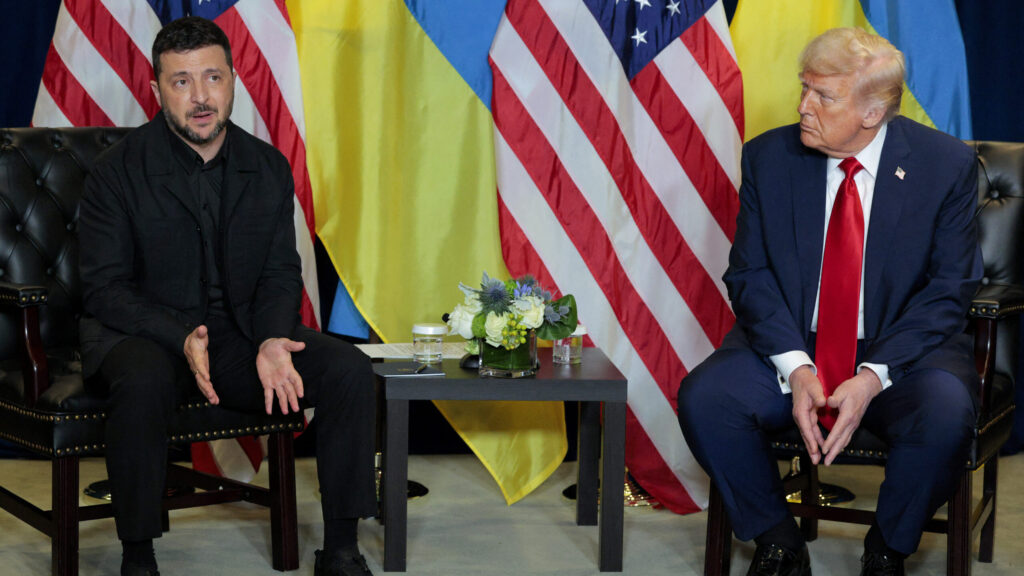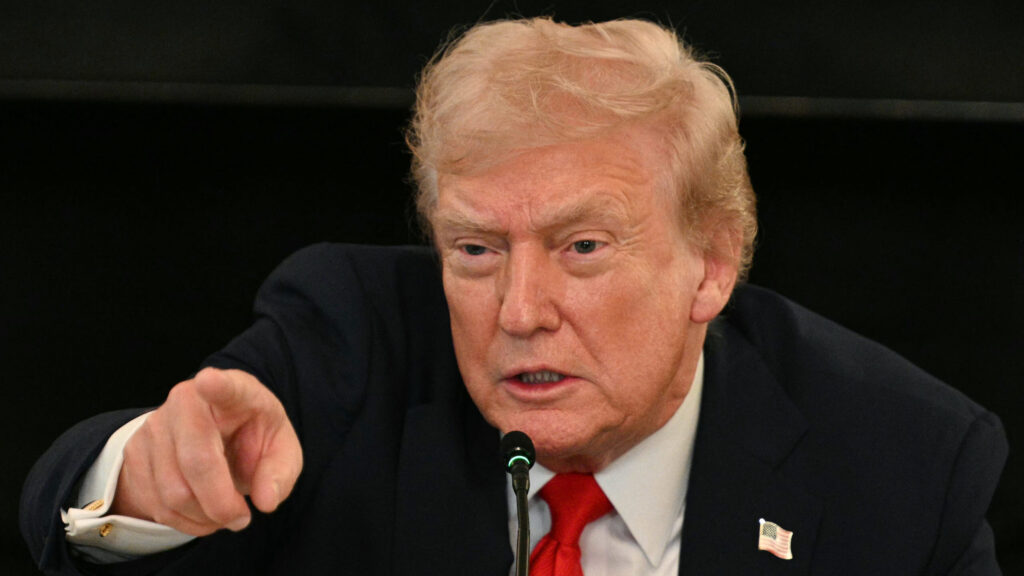Professor James Allan is a Canadian law professor teaching at the University of Queensland in Saint Lucia, Australia. His areas of interest are legal and moral philosophy, constitutional law and bills of rights. Professor Allan recently held a lecture at the Danube Institute about two high-profile cases of right-wing figures being punished by a seemingly politicized justice system in the United States: those of President Donald Trump and his fellow Canadian author Mark Steyn. Before his lecture, he was also gracious enough to sit down for an exclusive interview with Hungarian Conservative to further discuss these two cases, as well as the legal and moral theories related to them.
***
Donald Trump was convicted on 34 felony counts last month of falsifying business records and he’s about to be sentenced in a month.
It’s 7 July?
11th, I believe.
11th, okay.
So while being sentenced, the judge will have sentencing guidelines, but he’s not bound by that, correct?
Correct. That’s right.
What are the chances, in your opinion, that he’s actually going to send him to prison? What would be the consequence of that? And do you think that would be proper judgment on the judge’s part?
Nobody really has too good an idea of what he’s going to do. From my point of view, the trial was very flawed. So effectively, there are four trials going on against Mr Trump. Two of them are at the state level, two of them are federal. The New York trial that just convicted him was the weakest. All four are weak, but I think this is the weakest one. Effectively, what you need to prove is not just that he entered into a non-disclosure agreement—people do that all the time, Bill Clinton entered into them, Hollywood producers enter into them. So you have an NDA, that’s fine.
Now, the claim is that he falsified business records because Trump gave the money to his lawyer and his lawyer then gave the money to Stormy Daniels. Because Trump paid personally, that’s not a FEC violation. It’s not a federal election matter. By contrast, Hillary Clinton, when she paid for the Steele dossier, which was bogus. So that also went through her lawyer, but she had her campaign pay for that. So that is an FEC violation. She hasn’t been charged. So because Trump paid personally, you don’t trigger the FEC violation. So it’s a misdemeanour. Falsified business records, you pay a few thousand dollars, you go away. So the problem was for the Democrats, they didn’t really have anything to charge him with because the statute of limitations had run out. And so what Alvin Bragg, who came into office—they’re elected in most states, the Attorneys General. So he came in saying ‘I’m going to get Trump,’ and the number three man in the Biden Department of Justice came in, which is a very odd career choice. They came up with that you can turn it into a felony if the misdemeanour is in the pursuit of a felony. Now, no one has really said what the felony is. So that’s very odd. They brought the case in Manhattan, which votes 87–88 per cent Democrat, so the jury pool is terrible. It would be like charging a Democrat in rural Texas.
And also the instructions to the jury, very odd. I mean, what I’m going to say tonight is this would never happen in the rest of the common law Anglosphere.
There’s no chance at all that the judge would have such a charge to the jury. Normally you have to link up actus reus, the person’s act, with mens rea for a charge. So you did something, you intended to do it for this charge. And the judge said he did this, there are these three competing sort of woolly theories about what the other charge might have been. So, and I think the quote was something like, ‘If four of you think this, four of you think that, and four of you think another, that’s enough’. Well, that would never happen in Canada. So based on all of that, you know, he got convicted. Even pretty solidly Democrat legal commentators, Jonathan Turley, Alan Dershowitz, and Republican commentators who hate Trump, Bill Barr and Andy McCarthy say this is a garbage charge. He’s still been convicted.
And again, way worse things have been done by Democrats. So it’s a very low amount, I think they paid $130,000 to Stormy Daniels. So having convicted him, if someone says they know what the judge is going to do, they’re just not telling the truth. Right now, I think the Democrats have been surprised because they thought if we can convict Trump, his electoral fortunes will dissipate. That hasn’t really happened. There’ve been a couple of polls showing him slipping a little since the conviction, and a couple showing not really anything’s happened. He’s still slightly ahead, and his fundraising has exploded. I think in the 24 hours after the conviction he raised something like, off the top of my head…
$52 million.
$52 million, yeah. Which is the biggest single-day fundraising haul. That’s a lot. And a third of those were first time donors. And of course the judge also has donated to the Democrats and his daughter is a big time fundraiser for them. So if you were a cynic, what you would say is the judge will do what’s ever best for the Democrats. Probably right now putting him in prison is not what’s best for the Democrats.
But who knows, they might put him under house detention so he can’t campaign. Then the question is, what does Trump do about that? Well, there are very special paths where you can appeal to the federal courts. Because let’s be honest, if he appeals to the New York State court system, they’re just going to sit on it till after the election. I think then they would dismiss the appeal, but then it’s too late. So he’ll have to make an argument to the federal courts that this is out and out election interference, and then the federal courts can look at it. Can he get to federal courts or even the Supreme Court before the election? Who knows.
That’s what my next question was going to be. Even though the Democrats control the DOJ, the Department of Justice in the executive, Republicans have a majority, or, rather, conservatives have a majority on the Supreme Court. Do you think there could be an argument made that Donald Trump’s constitutional rights were violated a few times in this process? And if that ever got to the Supreme Court, do you think that it could be remedied there?
So what you notice when you look at the US Supreme Court is, people don’t realize that on a big chunk of cases that hit the Supreme Court, they’re nine to zero. This is an awful lot of cases and aren’t too politicized and they’re like nine-zero, everyone agrees. On the politicized cases, and this is just a generalized statement, the so-called Democrat appointees, the sort of judges who we would characterize as on the left, vote as a block. Not always. Republicans tend to splinter, and that’s partly because your way of seeing the world as a right-of-centre person tends to be more individualistic. You don’t vote as a block, they do vote as a block. And so the Republican majority on the Supreme Court is all over the place. Nobody has a clue what Roberts is going to do. He’s the most wishy-washy. He’s the one who caved in on the Affordable Care Act, Obamacare, and on Dobbs, the abortion case.
So, on a case like this, what would they do? Well, Roberts is trying his best for the court not to be seen as political, but the problem is on these sorts of issues whatever you do you’ll be seen as political Thomas and Alito are rock solid. I suspect that so many people see this as blatantly political, this charge in New York, that if he can get to the federal court, he has a chance. But again, you don’t really know.
Because you first have to get your appeal rejected in the state appellate court. You can’t go straight to the Supreme Court.
You can appeal through the New York system, and get to the very end of the New York system, and then if the Supreme Court wants to give you leave, and they don’t have to, they just take the cases they want. That’s not happening before the election. There is a process where you can go from this conviction straight to the federal courts and make an argument that it’s election interference and bypass the appeal altogether. And that would be fast enough to get a federal court judge to hear it, maybe. And so there’s some school of thought that says maybe he should try to do that. And that would be fast, because you have no hope. I just think the New York courts will just sit on it. And then after the election, they’ll say, ‘Oh, you win the appeal’. That’s no good to anyone.
In the meantime, there’s another case that’s being heard by the Supreme Court right now about Donald Trump’s immunity. It seems based on the questions they asked during oral arguments that they might be really in favour of Donald Trump and rule that his conduct was covered by immunity during the 6 January riots.
So again, as I’m going to talk about tonight, there’s four separate packages of cases. So you’ve got the two state cases, you’ve got the two attorneys general or a district attorney, the two district attorneys who came into office, Bragg and Fannie Willis. So there’s the Georgia State one, and she’s using RICO to try to talk about the Georgia election, also highly funded by, you know, Soros and wealthy Democrats to come into office. And then you’ve got two federal cases with Jack Smith. One of them is the one you’re talking about and the other one is the classified documents. So the 6 January one, the one you’re talking about, Trump has really, I’d say, at least four defences.
So this is the claim that Trump interfered with the election obstruction of justice, 6 January riots. So one defence is, well, he has presidential immunity. And that’s the one in front of the Supreme Court. But that’s probably not even the strongest defence. Then you’ve got, I took the lawyer’s advice. Now, if you do what your lawyer says, it’s hard to see how you can be convicted. Then you’ve got the First Amendment argument that this is an argument about what Trump said. And then you’ve got the mens rea defence. So if Trump actually believed he was cheated out of the election, it’s hard to see how you can convict him of anything because you need an act and an intention. And so those three defences are still in play no matter what happens with the presidential immunity. This is just the first defence of his, which stopped the trial and made its way all the way up to the Supreme Court. Now, that ruling will come out sometime in June. Usually the most contentious cases, the US Supreme Court leaves till the very end of June, sometimes even into July. And again, no one knows what the Supreme Court’s going to do, but as you say, there’s some speculation based on the questions that he might win that. But even if he doesn’t win that, it then goes back to the Washington DC case. And again, if you were cynic you’d say they brought it in Washington DC because 93 per cent of people vote Democrat there.
If he loses on the presidential immunity, he’s still got three defences, and I think the mens rea defence is pretty strong. He thought he was robbed, so it’s hard to see why this is a problem. And he took legal advice. And then you’ll have a theoretical argument about the First Amendment, which could work its way right back up to the Supreme Court. All that happens after the jury makes a call, though. Now if the Supreme Court decides at the end of June is there time to go back and actually have the trial? I don’t think so. I think the Supreme Court will sit on it to make sure that the trial won’t happen before the election, which is pretty much a win for Trump.
This always bothered me and I didn’t really understand it. He was tried in the Senate for the same conduct and then was acquitted. There was an impeachment, and then the President was acquitted in the Senate. Doesn’t that count as a trial?
No, because that’s not a judicial proceeding. Everyone says the Americans have separation of powers in their Constitution. But really, the Madisonian constitution is checks and balances. They have all these different institutions checking and balancing each other. There is overlap. So if you have a 50–50 Senate, the Vice President sits with the casting vote. So someone from the executive sits in the legislature, that’s fine for someone in the British tradition like a Canadian, but that’s not a separation of powers. And in impeachments, the chief justice of the Supreme Court sits as the judge on a legislative trial again, not a separation of power. So that was a case where, I think the problem is what the Democrats have done because the first impeachment was on the Ukraine stuff and it’s feeble, very feeble. And we now know that probably there was something very unusual going on with Hunter Biden, I mean, for someone who doesn’t speak Ukrainian and doesn’t know anything about the oil and gas industry to get paid $50,000 a month… He was getting paid millions a year. What was he bringing to the table? What was he giving to Burisma? Well, if you’re a cynic, you’d say he was giving access to his dad who was then the Vice President. And the Trump phone call thought this was fishy. So is that a cause for impeachment? Well, historically that would never have triggered it. Again, if you go down that road, you politicize it, it’s not obvious that doing that actually helps you. I mean, they impeached Bill Clinton.
And all ‘impeached’ means, it doesn’t mean you’re convicted of anything. If you say a president’s been impeached, all that means is that the House of Representatives has sent it up to the Senate for a trial. So that’s like he’s been indicted. If you’re impeached, it’s like you’ve been indicted. Now you’ll have the trial and the jury is the Senate, and you need two-thirds of the Senate, so that’s never going to happen. So Clinton was impeached and his popularity went up. And I think America is now so polarized. There’s such a partisan divide that the fact he was impeached meant nothing. And it’s looking like the fact that they ran this prosecution in New York might have taken a point or two off them in the polls, but so far that’s all it’s showing. And, you know, I’m somewhat sceptical that that will last through the next three or four months. So again, that was a legislative process against the president. So they’re now bringing a judicial process. But again, cynics would say this is lawfare.

In the meantime, Hunter Biden was also convicted. Some Democrat commentators would say that this is proof that the justice system is not favouring one side in power, but I assume that’s not your opinion.
Well, here’s the counterargument. The counterargument is some of the worst charges against Biden, he didn’t pay his taxes. I mean, I don’t think there’s any defence he would have against that. And those would have seen him go to jail for a long time. It was a lot of money. And the Department of Justice did not charge him until the statute of limitations ran out. So those were very serious charges. They brought the gun charges, much less serious. And even some of those charges, you know, the Republicans had to get a lot of publicity to get the Department of Justice to do that. Other things that he might have been charged with were, on the laptop, there seems to be a lot of claims that he was taking a lot of money from China and Ukraine and funnelling some of it back up through other people. So none of those have been charged. So if you were a cynic, you would say, okay, in the light of the fact that Mr Trump is being charged they had to charge him with something and they picked the weakest charges they could find, these gun charges. Yes, he’s a felon, but compared to what might have been charged with, they’re pretty feeble.
In your lecture, there’s another case that you reference, which I’m not familiar with. I just looked at the title. It’s Mark Steyn’s case, it’s in the title of your lecture. Can you talk about that case?
It wasn’t my title, but it is true, I will talk about it in the lecture. So, Mark Steyn in the Anglosphere is a well-known political commentator, He worked for the BBC before they became too left-wing for him. He was just working for GB News, he has worked for the National Review in the US. He’s had TV shows in the US. He’s Canadian by birth and has worked in Canada. He’s an incredibly well-known political commentator. And he also has written a bunch of number one New York Times bestsellers. And he’s always been sceptical of the sort of catastrophizing claims about global warming. There’s quite a well-known person, Michael Mann, who did the hockey stick graph and Mark Steyn attacked him relentlessly, saying this hockey stick is gamed. At any rate, Michael Mann sued Steyn for defamation. Now defamation trials in the US are a little different than they are in the rest of the English-speaking common law world because it’s very hard to sue a public figure. If you go back to New York Times v. Sullivan, the only way to sue a public figure is to prove malice. And that means that if you’re the person suing, you have to prove that Steyn not only was wrong about his claims about you—and I don’t even know that he showed that—but not just that he’s wrong, but that he knew he was wrong. So it’s lying deliberately.
Or recklessly, I believe.
Yeah, and you have to show that, which normally is near impossible. That’s why public figures in the US almost never sue for defamation because if someone honestly believes what they’re saying, then that’s the end of your case. No matter how implausible your claims are. Maybe if you could get emails saying, you know, an email saying, ‘I know he didn’t do it but I’m going to say it anyway,’ that would satisfy the malice test. And so Steyn gets sued in DC, originally with National Review. Mann who brought the case didn’t appear to have paid for his own lawyers. So there’s somebody funding it, probably people in the renewable scheme and they dragged it on for 10 years. So the people bringing the lawsuit didn’t want it to come to trial for 10 years. Mark Steyn ended up being his own lawyer because it was just too expensive. And what you need to know in the background of this is that in the entire English-speaking world, except for the US, we have a cost rule. Basically, what a cost rule means is if I sue you and I win you pay my lawyers’ cost, two-thirds of them And if I lose then I pay your costs. That’s a cost rule.
So if you go to India, or Singapore, or Jamaica or any of the sort of former British empire countries, Canada and New Zealand, we have a cost rule. The upside of that is it gets rid of frivolous litigation. The downside is it can sometimes be harder to sue. The Americans have never had a cost rule. So if I sue you in the US and I win, you don’t pay any of my costs. And of course, think about that. The downside of that is you could sue somebody for $82 million and you know that it’s going to cost them $100,000 to defend the trial, and so you say ‘Why don’t we settle for $50 million?’. As a business proposition, it’s worth settling. So that’s in the background in the Steyn trial, you need to know there’s no cost rule.
At any rate, it gets to trial after about 10 years. And the judge’s charge to the jury was, again, very bizarre, it would not have happened outside of the US.
Effectively, the judge allowed the plaintiff’s lawyer to say, well, whatever you think about the main charge, you should bring exemplary damages because we don’t want people like Steyn to be mocking climate change people.
Again, this would not happen outside the US.
Or D.C., basically.
Well, I mean, I don’t know about the rest of the US. But in a lot of non-American English speaking jurisdictions, they don’t even have exemplary damages. So the jury came back and the compensatory—this is what you get based on your legal argument—came back with $1. That’s effectively the jury saying, ‘Well, Steyn really won’. You won a technical win. I used to practice, and one of the first things you do if someone’s sued for defamation when there’s a cost system is you pay $1,000 into court because if I’m defending you and the jury comes back with derisory damages from the minute I have paid that money in the court, which is usually the first day you come and see me, the cost flip. So, as I said if I win you pay my cost and if you win, I pay your cost. But there’s a sort of secondary part to the cost rule, which is if I offered you more than you end up winning, and you turned it down, then from the day I offered you that money, you pay my costs. Right, so that’s the sort of secondary aspect of the cost rule. Normally, the winner gets his cost paid. But if you win and the other person offered you more money than you ended up winning at trial, then you have to pay. And so almost certainly in the non-American jurisdiction, Michael Mann would have had to pay millions of dollars to Steyn. No cost rule, so that’s not in play. But it just seems bizarre that a jury could come back with $1 million in exemplary damages when the actual damages suffered they thought was $1.
And again, he wasn’t able to prove he had any reputational loss, because he didn’t call a single witness. Because normally in a defamation trial, you have to say, well, you’ve ruined my reputation. So what is your reputational loss? And he couldn’t show any, because again, you know, he’s a big time global warming person, and the whole sort of gravy train of that is still really big. So, another very odd trial. It does look like lawfare in the sense that you use the judicial proceedings to achieve a political result you can’t achieve through the political process.
And that’s a problem. Because
once you start doing that on one side of politics, you force the other side of the side of politics to reciprocate. And you can undermine the idea that the courts are a neutral arbiter of reading what the law is and applying that law.
Because at the end of the day, everyone knows his or her game theory. And game theory, it’s just evolutionary biology, right? What are the winning strategies evolutionarily? One strategy is to be a total bastard all the time. And when you look in the animal kingdom, you can see that occasionally, cuckoos, right? But it’s not a strategy you see very much. Here’s a possible strategy. Just be nice all the time to everybody. And all of those creatures die out. It is a losing evolutionary strategy. If people treat you terribly and you’re nice back all the time, your genes don’t get passed on. The most successful strategy is called reciprocity: you’re nice until the other creature or person is a bastard to you, and then you reciprocate just as strongly or more. Then you get this stable sort of outcome. So that’s what reciprocity is, I’ll be nice to you until it looks like you’re a total bastard to me. And then I will reciprocate and be even more of a bastard back to you. That’s a stable strategy, that’s a winning strategy over time. That’s basic game theory.
And the problem is if the Republicans play by Marcus of Queensbury boxing rules and the other side is weaponizing the judicial system, then over time the Republicans will lose and so they have to reciprocate. And that’s the problem right now, is everyone says, ‘Oh, I don’t want the Republicans to win and reciprocate’, but otherwise they just look weak. So, you know, will they start impeaching Democrats? Will they start weaponizing the court?
They’ve impeached one so far, DHS Secretary Mayorkas, by one vote. So that just wasn’t as effective as the Democrats were.
Well, I mean, the Democrats were ruthless. They brought the three or four Republicans into the committee like Liz Cheney. They didn’t allow the Republicans to nominate their own people for the committee. Again, that’s never happened before. And every one of those Republicans who went on to that was voted out or resigned on that committee, I think that’s right.
I mean it’s a problem because to a large extent democracies work much better when there are these unwritten rules about sort of civilized behaviour. But if you perceive that the other side is picking particular jurisdictions and they’re being highly selective in how they go about using the court system, it starts to look a bit like Venezuela and you sort of have to respond. That’s the problem.
In Hungary, when we think of lawfare, the case that affects us most and our government deals with the most is the rule of law mechanism imposed by Brussels on the Hungarian government. And we make similar arguments on the right that this is lawfare, this is not what the EU treaties dictate. Are you familiar with that issue?
A little bit. My knowledge of the European Court of Justice is a bit limited, but it does seem to me that its interpretive approach to reading the underlying legal materials is living constitutionalism on steroids. I mean, if it were an American court or a Canadian court doing it, I’d say they’re making it up at the point of application, they’re just making the law up. When that starts happening it’s very difficult to know how to deal with it. You will eventually get a pushback, but it can take a long time. So if you look at Roe v. Wade, which I think in the US was just made up by the Supreme Court, it took over almost 50 years to get to the Dobbs case. It can take a long time. And so I take your point that you first have to have an argument about how judges ought to interpret the legal text. And I’m not a fan of moral readings or living constitution readings, which is what you tend to get out of European and British judges. The problem is that law is meant to lock you in. If you’re being an honest interpreter you’re not giving the outcome you want. That doesn’t lock anybody in, that just turns judges into legislators.
If your wife gives you a shopping list and says here’s the five things I want you are locked in by her intended meaning of the word. So she writes cherries, and you know that she always writes that because she wants you to buy cherry tomatoes, then the honest answer to what she meant was cherry tomatoes. You are locked in by some other person’s mind. And that is a physical constraint outside your own brain. If your goal is to find the most moral reading there are no external constraints, people disagree about what the most moral thing is. That’s problematic. And living tree constitutional reading just basically says, take the Constitution and update it through time based on what’s morally right, what’s politically best. And there’s no constraints on that. And that undermines the rule of law itself.

So, sometimes I agree with you, the idea is certainly a trend. I don’t speak for Hungary but certainly in the English-speaking world where some people and they do tend to be on the progressive left are using the notion of the rule of law that in a way undermines the old-fashioned rule of law. Because there’s two understandings of the rule of law. There’s the old-fashioned understanding: general rules known in advance, able to be understood and complied with, right? That’s the sort of Spartan procedural understanding. And to some extent, a lot of particularly progressive type lawyers, law professors have a substantive morally laden, morally pregnant understanding of the rule of law, which sort of infuses it with this moral test that it has to keep pace with, a certain level of ‘rights respecting’ or a moral standard, but people don’t agree about those things. People disagree about what’s rights respecting, and the normal way we deal with disagreement in a democracy is we count everyone equally and we vote. And if you lose you know that in three or four years’ time if you work hard every Saturday your party might win.
If you hand over decisions about what’s morally best to the lawyerly caste, to a bunch of unelected judges, you have no recourse. And that is very dangerous. It’s a very dangerous thing to give a certain group of people who are unelected, and in that sense, unaccountable, because all they are accountable to is their own moral consciences. And for a lot of people, that’s not much of an accountability. Well, it’s a problem. And I agree with you that the concept of the rule of law has—I mean, I prefer the old-fashioned procedural sense—transmogrified for many people into this sort of highly moralized substantive test where you effectively, by making it so morally substantive, you undermine the old-fashioned sense of general rules known in advance that everyone can see and play by the rules. That’s gone out of the window to a certain extent.
Related articles:







